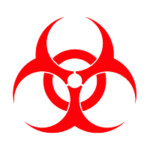Choking on water occurs when a person accidentally inhales liquid instead of swallowing it, which can lead to coughing, gagging, or even a feeling of breathlessness. This situation is often triggered by drinking too quickly, laughing or talking while sipping, or simply miscalculating a swallow. While it may seem less severe than choking on food, it can still pose serious risks.
For example, drowning is a major public health global burden causing over 300,000 deaths per year worldwide. Still, these numbers underscore the importance of water safety and the timely administration of first aid when someone chokes. When left untreated, choking on water can result in asphyxiation and aspiration pneumonia–a condition where liquid enters the airways and lungs, causing inflammation and infection.
As a result, it is essential to know what to do when someone chokes. This article will guide you through the steps to take, ensuring that you’re prepared to help someone in need and reduce the risk of severe health consequences.
Get CPR Certified in Minutes
Receive your CPR Certification today!
What is Choking on Water?
Drowning happens when water gets into your airway as opposed to the esophagus, causing a blockage hence normal breathing isn’t possible. This can occur if you drink too quickly to swallow, laugh or talk when drunk or suffer from a medical condition, track swallowing. To clear the airway and avoid asphyxiation when someone swallows water, a coughing fit occurs— which is our body’s natural reaction.
Choking on water is less dangerous than choking on a piece of solid food, but it can still be serious if the victim has certain health problems, or cannot cough. But, what to do if someone is choking? Well, the first thing to do is stay calm. Encourage them to cough to try to get the water out. On top of that, If they have trouble breathing or their throat starts to swell, it’s important to get medical help right away.
Also, there are several steps to tackle this issue that we will find out in the coming sections.
What are the Signs of Choking?
Being aware of the signs of choking can help prevent situations from getting worse when someone chokes on water. If you notice these signs, you can quickly start helping the person without wasting any time. Here are the key signs of choking that require immediate action:
- Coughing: A strong or forceful cough is often the body’s first response to try and clear the airway. If the person is able to cough, it’s a good sign, as they may be able to expel the liquid themselves.
- Gagging: This can occur as the person tries to swallow the water but accidentally inhales it instead.
- Wheezing or Gasping: Sounds like wheezing or gasping for air may indicate that the person is struggling to breathe due to liquid in the airway.
- Inability to Speak: The person may be unable to make any sounds or speak if their airway is obstructed.
- Panic or Distress: The person may appear anxious, frightened, or confused, often waving their arms or looking to others for help.
- Change in Skin Color: Bluish discoloration around the lips or face can indicate a lack of oxygen, which is a sign of severe choking.
- Loss of Consciousness: In extreme cases, if the airway is fully obstructed, the person may faint or lose consciousness.
Recognizing these signs quickly is crucial for providing immediate assistance.
Immediate Steps to Take When Someone is Choking on Water
When someone is choking on water, it’s important to act quickly and calmly. Here’s what you should do:
1. Encourage Coughing
When someone is choking on water and is still able to cough, it’s important to encourage them to continue coughing because this action helps expel the liquid from their airway.
Coughing generates pressure in the lungs, which can force out the obstruction and restore normal breathing. Interestingly, coughing can be more effective than performing the Heimlich maneuver in certain cases, as the body’s natural reflex is designed to clear the airway. The Heimlich maneuver, also known as abdominal thrusts, is a first aid technique used to help someone who is choking
For example, if someone accidentally swallowed water while laughing, encouraging them to cough might quickly resolve the issue, allowing them to breathe normally again.
2. Positioning
If someone is choking on water and struggling to breathe, having them lean forward slightly can help. This position allows gravity to work in your favor, making it easier for the person to expel the water from their airway.
For example, if a child accidentally inhales water while playing at the pool, encouraging them to bend forward can often help them cough it out more effectively.
Leaning forward is a natural reflex many people adopt instinctively when they’re about to vomit, as it helps prevent choking by allowing the contents to come out more easily.
3. Back Blows
If the person is still struggling after trying to cough, you can give them five firm back blows to help dislodge the water. To do this, stand behind them and lean them slightly forward.
Use the heel of your hand to deliver quick, strong strikes between their shoulder blades. This technique helps create pressure in the airway, which can force the water out and allow them to breathe again.
Interestingly, back blows can be more effective than you might think; they can work because they create a vibration in the airway that sometimes helps to dislodge the liquid without causing further distress.
4. Abdominal Thrusts (Heimlich Maneuver)
If back blows don’t help and the person is unable to breathe or speak, perform abdominal thrusts, also known as the Heimlich maneuver (already mentioned above).
To do this, stand behind the person and wrap your arms around their waist. Make a fist with one hand and place it just above their navel. Grasp your fist with your other hand and thrust inward and upward quickly.
This action creates pressure in the abdomen, helping to force any trapped water out of the airway. For example, if a friend is at a party and suddenly starts choking on water, using this technique could help them breathe again quickly and avoid a more serious situation.
5. Call for Help
If the person choking becomes unconscious, it’s crucial to start CPR immediately. Begin by calling emergency services if you haven’t already.
Lay the person flat on their back on a firm surface, ensuring their head is slightly lower than the rest of the body to help prevent choking on any remaining water. Perform chest compressions at a rate of 100 to 120 compressions per minute, pushing down hard and fast in the center of the chest.
If trained, you can also give rescue breaths after every 30 compressions, sealing your lips over theirs and breathing into their mouth twice.
Interestingly, many people are unaware that performing CPR can still be effective even if you’re unsure whether the person’s heart has stopped, as it can help keep oxygen flowing to their brain and vital organs until help arrives.
What To Do When a Children Chokes on Water?
When a child is choking on water, the steps to follow are similar to those for adults, but it’s essential to adjust your approach to suit their smaller size and heightened anxiety.
First, remain calm to help ease the child’s panic, which can make the situation worse. Encourage them to cough gently to clear the airway. If coughing doesn’t help, gently administer five back blows while the child is leaning forward slightly. Use the heel of your hand to deliver these blows between the shoulder blades, as this can help dislodge any trapped water.
A unique aspect to consider when assisting a child is the emotional component; their fear can escalate quickly. Reassuring them with a comforting voice can be crucial, as children may not fully understand the situation. If the child continues to struggle after these initial steps, seek medical attention immediately, as children may be more susceptible to complications like aspiration pneumonia.
Always remember that knowing how to respond calmly and effectively can significantly impact the outcome.
Receive your CPR Certification
Get your CPR certificate in less than 15 minutes*
How to Avoid Choking While Drinking Water in First Place?
Preventing choking on water is essential for maintaining safety, especially during meals or when drinking. Here are some effective strategies:
1. Take Smaller Sips
Taking small sips of water helps prevent choking because it allows the body to handle the liquid more easily. When someone gulps down a large amount at once, it can overwhelm the swallowing reflex, making it more likely for water to go down the wrong way.
For example, if a person tries to drink a full glass of water too quickly while laughing or talking, they may accidentally inhale some of the liquid, leading to choking.
Encouraging everyone, especially children, to take smaller sips can make drinking safer and more comfortable.
2. Avoid Distractions
When drinking, focusing solely on the act helps prevent choking incidents. Engaging in conversations, laughing, or watching TV while swallowing can distract the brain from coordinating the swallowing process, increasing the risk of water going down the wrong pipe.
Interestingly, studies suggest that our brain processes auditory and visual stimuli simultaneously, which can interfere with the swallowing reflex.
Therefore, keeping a calm and distraction-free environment during drinking can make a significant difference in safety and comfort, especially for children and individuals prone to choking.
3. Sit Upright
Sitting upright while drinking helps the body manage swallowing better. This position aligns the throat and esophagus, making it easier for water to flow down smoothly without getting stuck.
When someone leans back or slouches, it can lead to awkward angles that increase the risk of choking.
Encouraging a straight posture ensures that any liquid consumed goes down properly, minimizing the chance of it going down the wrong way and causing distress.
4. Stay Calm
Staying calm is crucial when someone is choking on water, as panic can worsen the situation for both the person choking and those around them. A calm demeanor helps the person who is choking feel more at ease, making it easier for them to focus on resolving the issue.
For instance, if a child starts coughing and seems to be choking, a parent who speaks softly and reassuringly can help the child remember to cough forcefully to clear the water.
This support not only helps in their recovery but also prevents added stress that could complicate the situation.
5. Teach Proper Swallowing Techniques
Teaching proper swallowing techniques is important for everyone, especially children, to help prevent choking.
Encourage individuals to take small bites of food and chew thoroughly before swallowing. This allows the food to break down, making it easier to swallow safely. For example, when a child eats a piece of fruit, remind them to chew it into smaller pieces and not rush their meal.
Taking time to swallow properly reduces the chances of food or liquid getting stuck in the throat, making mealtime a safer and more enjoyable experience.
6. Use Appropriate Cups
Using appropriate cups can make drinking safer, especially for young children and those who might have difficulty swallowing.
Spill-proof cups help control the amount of liquid that comes out, reducing the chance of choking. Cups with straws can also be a great option, as they allow for slower sipping and better management of liquid intake.
These tools encourage kids to drink without rushing and help them stay focused on swallowing properly. This is why choosing the right cup makes a big difference in ensuring a safe and enjoyable drinking experience.
7. Supervise Young Children
Always keep a close eye on young children while they are drinking, as they may not be aware of the risks associated with choking.
Children can get excited or distracted easily, leading them to gulp down water quickly or talk while sipping. Being present helps ensure they take their time and focus on swallowing properly. If a child starts to cough or show signs of distress, immediate attention can prevent a serious situation.
Creating a safe drinking environment with supervision fosters good habits and keeps children safe from choking incidents.
Act on Emergencies of Water Choking
Knowing how to respond when someone is choking on water can make a significant difference in an emergency. Remaining calm is essential, as it helps the person feel more secure. Encourage them to cough forcefully to clear the water. If coughing does not work, using back blows can be effective. Always be aware of signs that require medical attention, like difficulty breathing or chest pain. Being prepared with first aid knowledge enables everyone to handle such situations confidently and effectively, ensuring safety for themselves and others during emergencies.
FAQ
1. What to do when Choking on Saliva?
If choking on saliva, try to cough forcefully and take slow, deep breaths to clear the airway. If breathing becomes difficult, perform the Heimlich maneuver or call emergency services immediately.
2. Can choking on water give you pneumonia?
Yes, choking on water can lead to aspiration pneumonia if the water enters the lungs instead of the stomach. This can introduce bacteria or other irritants into the lungs, potentially causing infection. If symptoms like coughing, wheezing, fever, or difficulty breathing occur after choking, seek medical attention.
3. What happens if water gets in your lungs while drinking?
If water enters your lungs, you may cough to clear it. In larger amounts, it can cause irritation or aspiration pneumonia, so seek help if breathing issues persist.






